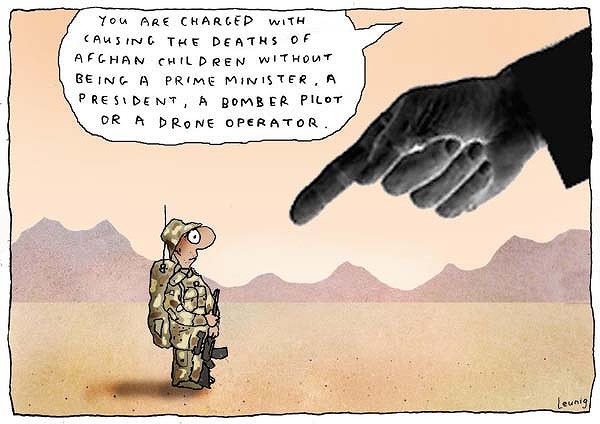Search
Democracy Links
Member's Off-site Blogs
defending our way of life .....

At the insistence of the Greens, we are about to get a full-scale parliamentary debate on our military involvement in Afghanistan some time soon - the only foreign policy demand in our 17 days of political haggling.
So let's hope our kinder and gentler MPs do their homework and make the best of it, instead of resorting to the usual pieties about standing behind our fighting soldiers until the job is done.
The question is: what is the job? Fortunately, some very good discussion papers are starting to come out of respected think tanks and policy groups to guide our thinking. And some bad ones too.
One that should make MPs on both sides sit up comes from the International Institute for Strategic Studies, in London, which argues for a prompt withdrawal of US and allied forces from southern Afghanistan - which would mean Australia's 1550 troops in Oruzgan, too.
The institute is no surrender-monkey pacifist outfit, but a red-blooded forum for realpolitik thinkers, as well as those interested in military affairs and the boys' toys of war. So when its latest annual strategic survey calls the current policy in Afghanistan profoundly mistaken, defence ministers and generals around the world will sit up.
The institute says the current ''counterinsurgency'' approach being applied by the US commander General David Petraeus is "too ambitious, too removed from the core security goals that need to be met, and too sapping of diplomatic and military energies needed both in the region and elsewhere".
Both the institute and the Washington group accept that power sharing, including the heterogeneous Taliban, and devolution from Kabul are the way to bring a kind of peace to Afghanistan. Attempts at building a strong state there have always met fierce resistance.
''The current US military effort is helping fuel the very insurgency we are attempting to defeat,'' the Afghanistan Study Group says, reinforcing the perception of the US as a foreign occupier. Efforts to limit civilian casualties have been only partially successful, causing additional Afghans to take up arms.
The military strategy is failing because ''the prerequisites for success don't exist'' - Taliban forces can melt away from superior force and regroup, and the Afghan President, Hamid Karzai, has failed to become an effective local partner after six years. The local security forces that are being ''mentored'' will cost more than Kabul can afford.
- By John Richardson at 12 Sep 2010 - 7:35am
- John Richardson's blog
- Login or register to post comments
Recent comments
4 hours 8 min ago
5 hours 6 min ago
5 hours 14 min ago
5 hours 22 min ago
7 hours 46 min ago
9 hours 8 min ago
10 hours 59 min ago
1 day 5 hours ago
1 day 7 hours ago
1 day 8 hours ago